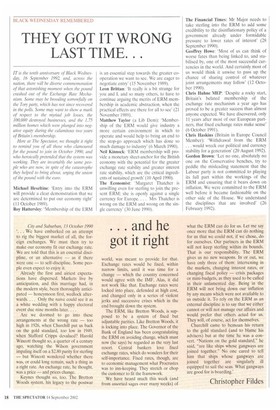THEY GOT IT WRONG LAST TIME. . .
IT is the tenth anniversary of Black Wednesday, 16 September 1992, and, across the nation, there will be diverse commemoration of that astonishing moment when the pound crashed out of the Exchange Rate Mechanism. Some may be brooding sorrowfully on the Tory party, which has not since recovered in the polls. Some may want to show a mark of respect to the myriad job losses, the 100,000 destroyed businesses, and the 1.75 million homes which were plunged into negative equity during the calamitous two years of Britain's membership.
Here at The Spectator, we thought it right to remind you of all those who clamoured for the pound to join in October 1990, and who heroically pretended that the system was working. They are invariably the same people who are now, in spite of the catastrophe they helped to bring about, urging the union of the pound with the euro.
Michael Heseltine: 'Entry into the ERM will provide a clear demonstration that we are determined to put our economy right' (11 October 1989).
Roy Hattersley: 'Membership of the ERM
is an essential step towards the greater cooperation we want to see. We are eager to negotiate entry' (15 November 1989).
Leon Brittan: 'It really is a bit strange for you and I, and so many others, to have to continue arguing the merits of ERM membership in academic abstraction, when the practical effects are there for all to see' (21 November 1989).
Matthew Taylor (a Lib Dem): 'Membership of the ERM would give industry a more certain environment in which to operate and would help to bring an end to the stop-go approach which has done so much damage to industry' (6 March 1990). Neil Kinnock: `ERM membership will provide a monetary sheet-anchor for the British economy with the potential for the greater exchange rate stability and greater interest rate stability, which are the critical ingredients of sustained growth' (10 April 1990). The Economist: 'Margaret Thatcher is unwilling even for sterling to join the present ERM; she is openly against a single currency for Europe.. . . Mrs Thatcher is wrong on the ERM and wrong on the single currency' (30 June 1990). The Financial Times: Mr Major needs to take sterling into the ERM to add some credibility to the disinflationary policy of a government already under formidable pressure to lower rates of interest' (28 September 1990).
Geoffrey Howe: Most of us can think of worse fates than being linked to, and stabilised by, one of the most successful currencies in the world. And certainly most of us would think it unwise to pass up the chance of sharing control of whatever joint arrangements may follow' (12 October 1990).
Chris Huhne MEP: 'Despite a rocky start, Britain's belated membership of the exchange rate mechanism a year ago has proved to be a greater success than almost anyone expected. We have discovered, only 11 years after most of our European partners, that fixed exchange rates make sense' (6 October 1991).
Chris Haskins (Britain in Europe Council Member): 'Withdrawal from the ERM . . . would wreck our political and currency stability for a generation' (20 August 1992). Gordon Brown: 'Let no one, absolutely no one on the Conservative benches, try to peddle the misleading statement that the Labour party is not committed to playing its full part within the workings of the ERM and ensuring that it bears down on inflation, We were committed to the ERM well before it became fashionable on the other side of the House. We understand the disciplines that are involved' (26 February 1992).










































































 Previous page
Previous page